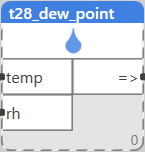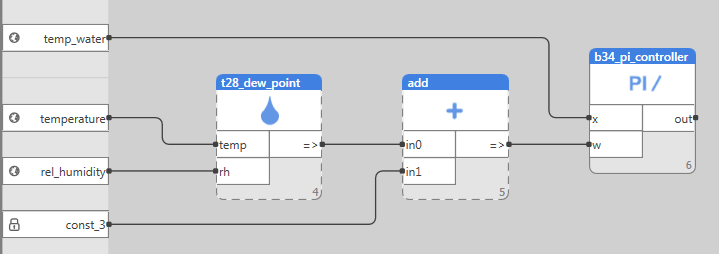Dew point calculation
Function name
T28_DEW_POINT
ST call
PROGRAM TEST_T28 VAR REAL1,REAL2,REAL3: REAL; END_VAR REAL1:= LIB.HVAC.V1_0.T28_DEW_POINT(TEMP:=REAL2, RH:=REAL3); END_PROGRAM
Library
LIB\HVAC
Version
V1.0
Description
The function calculates dew point temperature of humid air at standard pressure of 101 325 Pa, based on air temperature and relative humidity.
Inputs
| Input | Type | Description | Default value |
| TEMP | REAL | Air temperature (°C) | 22 |
| RH | REAL | Relative air humidity (%rH) | 70 |
Outputs
| Output | Type | Description |
| ⇒ | REAL | Dew point temperature (°C) |
Function
Dew point is a temperature at which the air humidity condenses. The function calculates this value from the temperature and relative humidity of the air. The water vapours condense at surfaces with lower temperature than the dewpoint temperature, forming water drops. If air shall be dehumidified, it must be cooled down to a temperature lower than its dew point. The higher the difference between the cooled air temperature and the dewpoint temperature is, the more efficient the dehumidification is.
Application example
The dew point temperature is calculated in the T28 function. A safety constant about 3 K is added, and the result is minimum water setpoint temperature for chilled ceilings. Then the chilled ceiling surface temperature will never go below the dew point, and condensation will be prevented. This is called active dew point protection. It may bring down the cooling power, on the other hand, but it is not necessary to install a separate dew point detector at every panel, and the cooling power is limited continuously rather than just cut down. Thus, even at weather with high condensation risk, the cooling system stays active to some extent.

